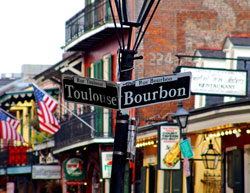 I was lunching with a friend when some woman leaned over and said,
“Do you realize you’ve been talking about food for an hour straight?”
“I can’t help it,” I replied. “I’m from New Orleans. We’re all like
this.”
I was lunching with a friend when some woman leaned over and said,
“Do you realize you’ve been talking about food for an hour straight?”
“I can’t help it,” I replied. “I’m from New Orleans. We’re all like
this.”
Honestly, where I come from, it’s perfectly normal to plot lunch
while eating breakfast, to discuss past and future meals while having
lunch, to treat every supper as if it were the last, to call friends
and ask: What’d ya eat today?
Back in ’05, my dad was hospitalized – a routine procedure for a
stomach hernia. Unfortunately, this resulted in post-operative ileus:
his intestines refused to return to work after the anesthesia wore off.
And while I too have been tempted to not return to work after a little
R&R…come on, you’re intestines, you have to go back to work.
Otherwise, nothing that goes in can come out.
One week passed. Two weeks passed. Slackers. I flew home to New Orleans.

 “Named for the mythical winged horse that carried thunderbolts for the Greek God Zeus, Pegasus Café has a classic pristine feeling.”
“Named for the mythical winged horse that carried thunderbolts for the Greek God Zeus, Pegasus Café has a classic pristine feeling.”